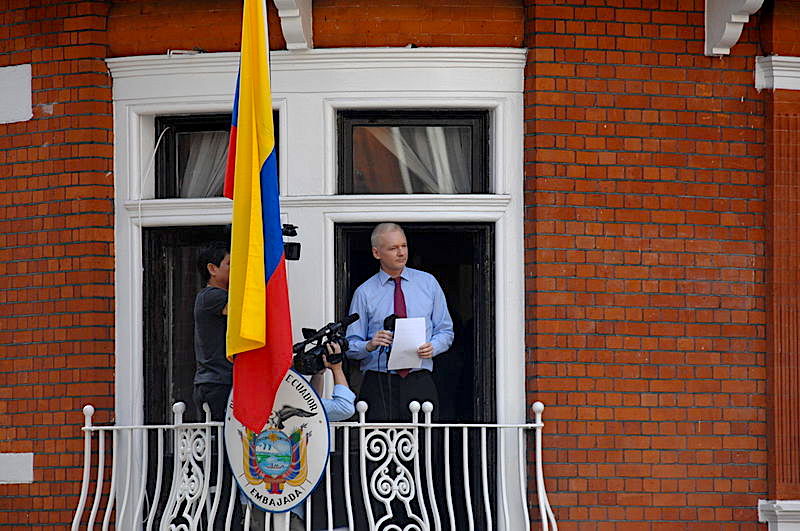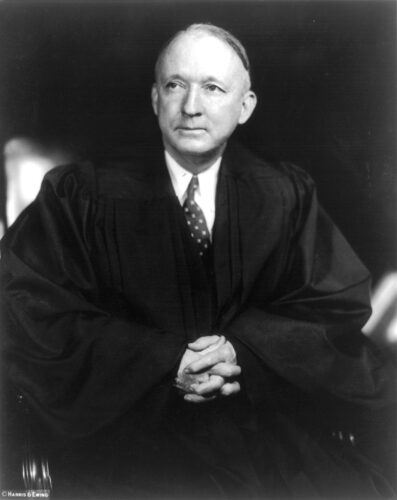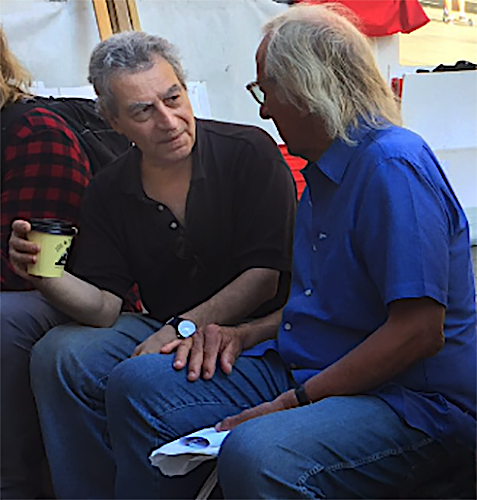Since 2006 WikiLeaks has been censuring governments with governments’ own words. It has been doing the job the U.S. constitution intended the press to do, says Joe Lauria.
By Joe Lauria
 In his 1971 opinion in the Pentagon Papers case, U.S. Supreme Court Justice Hugo Black wrote:
In his 1971 opinion in the Pentagon Papers case, U.S. Supreme Court Justice Hugo Black wrote:
“In the First Amendment the Founding Fathers gave the free press the protection it must have to fulfill its essential role in our democracy. The press was to serve the governed, not the governors. The Government’s power to censor the press was abolished so that the press would remain forever free to censure the Government.”
That’s what WikiLeaks and Julian Assange have been doing since 2006: censuring governments with governments’ own words pried from secrecy by WikiLeaks’ sources—whistleblowers. In other words, WikiLeaks has been doing the job the U.S. constitution intended the press to do.
One can hardly imagine anyone sitting on today’s U.S. Supreme Court writing such an opinion. Even more troubling is the news media having turned its back on its mission. Today they almost always serve the governors—not the governed.
The question is why.
Consolidation of media ownership has increased obedience of desperate journalists; entertainment divisions have taken over news departments; and careerist reporters and editors live vicariously through the power of those they cover, rejecting the press’ unique power to hold those officials to account.
It comes down ultimately to lifestyles. Men go to war to protect and further their lifestyles. The press cheers them on for residual material betterment and increase in status.
Millions of lives erased for lifestyles.
It used to be accepted in television that news departments would lose money and would be supported by the entertainment division. That’s because news was considered a public service. TV newsmen — they were almost all men in those days— were former wire service and newspaper reporters.
But greed has put the presenters’ personalities before public service, as entertainment masquerades as news. Newspapers have sacrificed investigative units to maximize profit. Government is the winner.
The abdication of the mainstream media of their constitutional responsibility to serve the governed and not the governors has left a void filled for more than a decade by WikiLeaks.

Julian Assange speaking from balcony of Ecuador embassy in London, December 2018. (Snapperjack CC BY-SA 2.0, Wikimedia Commons)
No longer do today’s Daniel Ellsbergs need to take their chances with editors at The New York Times or The Washington Post, or with their reporters spinning the damning information they risk their freedom to get to the public — no matter how disinterested and distracted the public may be.
Now the traditional media can be bypassed. WikiLeaks deals in the raw material, that governments hang themselves with. That’s why they want Assange’s head. They lust for revenge and to stop further leaks that threaten their grip on power.
That the corporate media has turned on Assange and WikiLeaks reveals their service to the state and how much they prioritize their style of life — disregarding the carnage they help bring about.
In that Pentagon Papers’ decision, the majority of the court ruled that the First Amendment prohibited the government from exercising prior restraint — or censorship — on the media before publication of classified information. But the majority of the court also said the government could prosecute journalists after publication.
Indeed the U.S. Espionage Act, which has withstood First Amendment challenges, criminalizes a publisher’s or journalist’s mere possession, as well as dissemination, of classified material. A 1961 amendment to the Act extended U.S. jurisdiction across the world. Assange is threatened by it.
U.S. administrations have been reluctant to take the step of post-publication prosecution, however.
Richard Nixon did not prosecute Sen. Mike Gravel, who was constitutionally protected when he read the Papers, given to him by Ellsberg, into the Congressional record. But Gravel could have been prosecuted for publishing the Papers as a book. (Nixon empaneled a grand jury to indict New York Times reporters for publishing the Papers, but the case fell apart when it emerged that Ellsberg’s phone had been tapped.)
Barack Obama decided to back off Assange when it was plain The New York Times and other corporate media would be as liable as Assange and WikiLeaks for publishing classified information. The virulently anti-media Trump administration, however, took that step when Assange was arrested.
From their point of view it’s easy to understand why the U.S. wants to crush Assange. But what is Australia’s excuse? Why is it fighting America’s battles? Why has the Australian mainstream media also turned against Assange after an election held in the U.S., not here?
What has happened to Australia’s sovereignty? That’s a question that can be answered by Australians coming into the streets, like today — and staying there until their compatriot is at last free. Free to continue to do the job the media refuses to do and that the U.S. Constitution mandated.
Joe Lauria gave the original version of this speech at a rally for Julian Assange in Sydney on March 3, 2019. You can watch the video of the speech here:
Video by Cathy Vogan
Joe Lauria is editor-in-chief of Consortium News and a former U.N. correspondent for The Wall Street Journal, Boston Globe, and numerous other newspapers, including The Montreal Gazette and The Star of Johannesburg. He was an investigative reporter for the Sunday Times of London, a financial reporter for Bloomberg News and began his professional work as a 19-year old stringer for The New York Times. He can be reached at joelauria@consortiumnews.com and followed on Twitter @unjoe



I would suggest the word syndicate rather than government I don’t feel governed, I feel ruled by a bunch of syndicated assholes.
Every institution in the US and the West is captured by corporate interests. The only thing that can change that are masses of people in the streets shutting the system down. All the more reason for those interests to sow chaos, hatred of the other and confusion to prevent that from happening.
The White House thinks it can avoid accountability for its persecution of WikiLeaks and Assange by claiming Assange is not a journalist. Their belief in their own invincibility makes them think that by saying it, it becomes reality. Pride goeth before a fall however.
“But what is Australia’s excuse? Why is it fighting America’s battles? Why has the Australian mainstream media also turned against Assange after an election held in the U.S. …?”
Australia is not sovereign, it is an occupied nation (by the US empire) without sovereignty. There is a pantomime of democracy resembling that of the US, but it is not connected to policy… just like in the US. The Aust media is the US media in practice. Remember that speech from “Network (1976)”?
It begins – “You have meddled with the primal forces of nature, Mr. Beale!”
Continues – “There are no nations…”
My dude, there is no sovereignty in the empire.
Protest is not effective. Protest is speech. They heard us, they just don’t give a ****.
This tool is blunt and deliberately blunted by law.
The old traditions of popular resistance are dead. Something different has to emerge, and my guess, is that it won’t involve the surveillance phones Snowden warned about. May that emergent day come soon.
Thanks for this , Joe. But you did not mention that the “lifestyle” mindset is the doctrine of capitalism and the profit motive that is placed by capitalists ahead of truth or justice, or in fact life itself. Mainstream journalists are just readers of what is put in front of them, and we know that the government is never going to put anything critical of itself in front of a newsreader. These readers are paid astronomical salaries to be servants of government and they will cling to that money with all of their strength. This is why I do not read or listen to mainstream media. I do not trust them. I do not support capitalism or the profit system. This is why I read Consortium News. Keep fighting.
I agree on both counts. CN is a jewel, almost the only thing worth reading these days. But instead of “Men go to war to protect and further their lifestyles”, it would have been closer to the truth to say (pertaining to Australians and Americans) that they are sent to war to protect the lifestyles of the ruling capitalist class. I tend to think that Joe would agree with this.
Do regular soldiers go to war to further their lifestyles? It is obvious what men were being talked about here. Also this is no longer the 1930s. You can write a critique of capitalism without having to use the word ‘capitalism.’